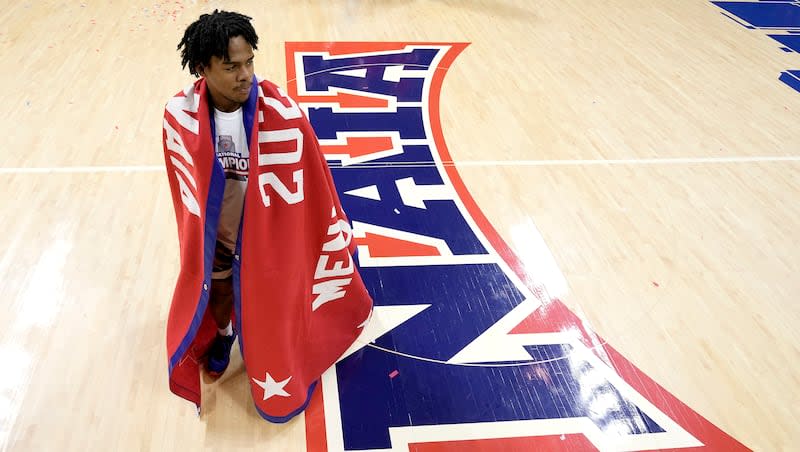NAIA largely bans transgender athletes from competing in women’s sports

A new National Association of Intercollegiate Athletics policy largely bans transgender athletes from competing in women’s sports at small colleges around the country.
The NAIA Council of Presidents adopted the policy Monday in a unanimous vote at its annual convention in Kansas City, Missouri. The NAIA oversees about 83,000 athletes competing in more than 25 sports at 241 schools. It is believed to be the first college sports organization to take such action.
About 82% of NAIA colleges are private and 65% are faith-based institutions. There are no NAIA schools in Utah.
The policy states that “only NAIA student-athletes whose biological sex is female may participate in NAIA-sponsored female sports.” Per the policy, “Biological sex is defined by distinguishing characteristics and can be supported by birth certificate or signed affidavit.”
Athletes who have begun “masculinizing” hormone therapy may participate in workouts, practices and team activities but not intercollegiate competition. Students who have not started hormone therapy may participate without limitation. At the school’s discretion, transgender athletes can play in games that do not count on the team’s win-loss records, according to the policy.
The policy states that Title IX ensures there are separate and equal opportunities for female athletes.
With the exception of competitive cheer and competitive dance, which are co-ed, the NAIA has separate categories for male and female athletes, noting every other sport “includes some combination of strength, speed and stamina, providing competitive advantages for male student-athletes.”
The policy is set to take effect Aug. 1, 2024.
Fair or unfair?
NAIA President and CEO Jim Carr told The Associated Press he understands the policy will generate controversy but that it was deemed best for member schools for competitive reasons.
“We know there are a lot of opinions, and a lot of people have a very emotional reaction to this, and we want to be respectful of all that,” he said. “But we feel like our primary responsibility is fairness in competition, so we are following that path. And we’ve tried as best we could to allow for some participation by all.”
The National Women’s Law Center condemned the policy.
“We are outraged by the recent decision of the National Association of Intercollegiate Athletics to ban transgender women from participating in women’s college sports teams,” Shiwali Patel, director of Justice for Student Survivors and senior counsel, said in a statement.
“This is unacceptable and blatant discrimination that not only harms trans, nonbinary and intersex individuals, but limits the potential of all athletes. It’s important to recognize that these discriminatory policies don’t enhance fairness in competition. Instead, they send a message of exclusion and reinforce dangerous stereotypes that harm all women.”
The Independent Women’s Forum and the Women’s Sports Foundation have opposing views on the NAIA policy, the former saying it protects and provides equal opportunity for female athletes, while the latter says it’s harmful for all athletes.
❌ @WomensSportsFdn should be standing with women & celebrating the @NAIA's move to protect the safety, equal opportunity, & privacy of female athletes.
The evidence is very clear- Men have an athletic advantage over women. Get the facts 👇https://t.co/aeWkgyttBb https://t.co/jSjb9gedFL— Independent Women's Forum (@IWF) April 9, 2024
What is the NCAA transgender athlete policy?
Shortly after the NAIA announcement, the NCAA released a statement saying, “College sports are the premier stage for women’s sports in America and the NCAA will continue to promote Title IX, make unprecedented investments in women’s sports and ensure fair competition for all student-athletes in all NCAA championships.”
The NCAA policy requires transgender athletes to complete one year of testosterone suppression treatment before competing on a women’s team. It also calls for transgender athletes to meet the sport-specific standard for documented testosterone levels before the regular season, before an NCAA championship event and before any competition in the non-championship segment.
A group of female athletes, including Riley Gaines, a former University of Kentucky swimmer, sued the NCAA over its policy toward transgender athletes. The lawsuit claims the NCAA violated Title IX by allowing transgender athlete Lia Thomas to compete in the 2022 swimming championship, arguing that female competitors don’t have “equality and equal opportunity” in sports competitions.
In response to the NAIA police, Gaines posted on X, formerly Twitter, “Take note @NCAA.”
Can transgender girls play sports in Utah?
At least 24 states, including Utah, have laws banning transgender women and girls from competing in women’s or girls athletics.
Utah prohibits girls who are transgender from competing in female sports sanctioned by the Utah High School Activities Association. Three transgender girls who attend Utah public schools sued the state over the ban. The law is effectively on hold pending the legal challenge, although transgender girls seeking to participate in UHSAA-sanctioned girls sports can appear before the School Activity Eligibility Commission that determines on a case-by-case basis if their participation compromises fairness.
Under the law, the eligibility panel is allowed to ask for and assess the student athlete’s height and weight in deciding whether a transgender girl would have an unfair advantage.

